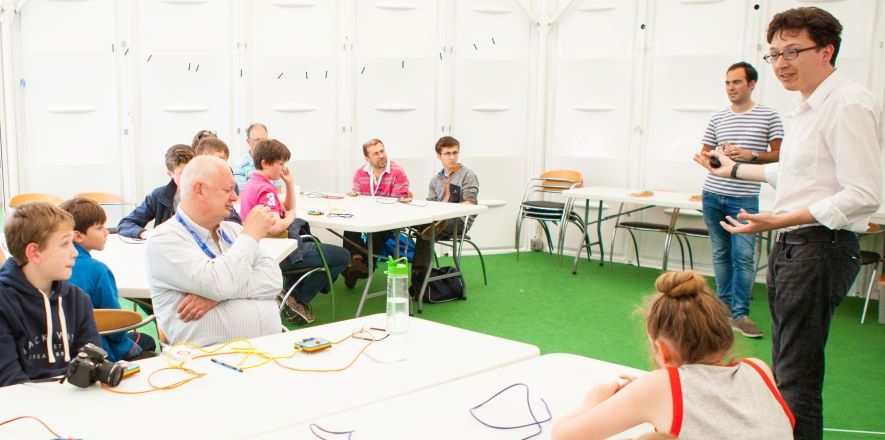
Submitted by Rachel Gardner on Thu, 14/05/2020 - 15:29
When coronavirus first saw researchers working from home and unable to meet for the normal weekly seminars "that are the lifeblood of research groups", new Research Fellow Jamie Vicary (pictured above, top right) thought something should be done.
So he and two colleagues in his field (Alexandra Silva from University College London and Pawel Sobocinski, Tallinn University of Technology, Estonia) set up a new initiative. OWLS – Online Worldwide Seminars on Logic and Semantics – are virtual events that strive to give participants as much of the real-world experience of a research seminar as is possible
Those who take part not only hear the speaker’s talk but can also see members of the audience asking questions and interact with the discussions that arise. They can also socialise at small group 'coffee breaks' before and after the event that provide valuable opportunities for networking and making research connections.
"We've even seen replicated online the experience you get in real life where, half-an-hour after the event, the speaker is still there and surrounded by a small group of die-hard enthusiasts, pressing him on some particular points of his talk," says Jamie.
And adding these 'soft' parts of the seminar experience have made these events very appealing, he adds. More than 350 researchers from around the globe took part in the first one. "And given that this field is quite specialised, that probably represents a pretty large part of the community working in it," Jamie explains.
Ironically – yet also fittingly in this context – Jamie’s presence here in this department is itself only virtual. He is a new member of staff, a Senior Lecturer and Royal Society University Research Fellow, who officially joined the Programming, Logic and Semantics research group here at the beginning of April. But that was a week into lockdown. So instead of a room in the William Gates Building, he works in 'Jamie’s Virtual Office' – or in the privacy of his garage.
Jamie was previously a lecturer at the University of Birmingham and before that a postdoctoral researcher in Oxford. His work is on higher category theory and its applications in computer science and mathematics, particularly in areas related to quantum structures.
"I am interested in the questions of foundations: what is a computer, what are the fundamental capabilities of computers, and in particular, what mathematical tools could we use to reason in new and exciting ways about computers?"
His particular focus recently has been on quantum computing. "The computers we have now, though very powerful, are actually quite basic and essentially run on the rules of ordinary logic: ‘if this, then that’. But a quantum computer would exploit completely new possibilities in physics that would give them orders of magnitude more capacity and capability. So it’s a very exciting field."
But for the development of quantum computers to progress, it is vital that researchers meet to share their results and exchange ideas. And for young researchers, it is a key boost to their career prospects if they are selected to give talks at the big annual conferences.
But this system is creating a huge carbon footprint, Jamie argues, when researchers from around the world all travel to one city, such as Vancouver or Sydney, for these events.
"So one of the ideas behind OWLS was to show people how much of the interactive conference or seminar experience we can replicate virtually. We’ve used Zoom technology and even with 350 people joining and using their webcams simultaneously, it has worked pretty smoothly – I’ve been impressed."
"Of course, there are disadvantages," he adds. "The best way to have a scientific discussion with a colleague is in person, in front of a whiteboard. But virtual meetings have their own advantages: at our last seminar, I saw a colleague from Australia that I hardly ever get to meet and was in a chat room with him and another colleague from the US when in the real world, it’s very rare that the three of us can get together in person."
He hopes that initiatives such as the OWLS seminars will help persuade us, when lockdown ends, that there are valid sustainable alternatives to the many in-person research conferences that take place.
"With OWLS, we want to show that it’s possible to have meaningful online scientific events where you can do all the interactive stuff – the networking and exchanges of ideas – online without having to burn so much carbon. And I think we can make it work well."
- For details of upcoming OWLS seminars, see: https://www.cs.bham.ac.uk/~vicaryjo/owls/

